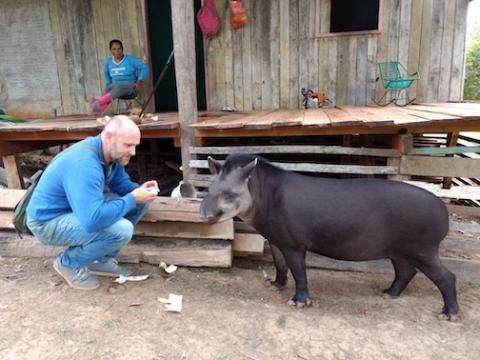
Words by: Emma Olsen, Photo by: Pedro Marques Ribeiro Filho
Professor of Anthropology, Jeffrey Hoelle, is this year’s Campus Sustainability Champion. The Sustainability Champion is awarded to a faculty member that conducts innovative research that engages undergraduate and graduate students in sustainability issues and will provide campus-wide leadership and visibility in sustainability education and research.
Hoelle has been with UC Santa Barbara for 8 years, teaching courses that are cross-listed in Anthropology and Environmental Studies. He is also affiliated with the Geography and Latin American Studies departments. Hoelle’s primary research explores the socio-ecological landscapes in the Brazilian Amazon, understanding how people conceptualize and relate to the natural environment. Specifically, his research focuses on people in the Amazon who engage in activities that degrade the land, such as cattle ranching and gold mining. Hoelle seeks to understand the interconnected and complex relationship that humans have with nature. Hoelle has received awards from the American Anthropological Association and the Latin American Studies Association.
At UC Santa Barbara, he encourages his students to challenge their assumptions about nature and the environment. He wants students to understand nature as a concept that extends beyond the beautiful, physical natural environment that you have to go camping to experience. He is passionate about reframing many students’ feelings of helplessness and the romanticization of nature as something that is so distant. His classes at UCSB allow students to experience nature and see the world in a different way, as they begin to notice a lot more about the plants, wildlife, and landscape of their local environment. One assignment for his Environmental Anthropology class (ANTH 152/ ES 151) is a scavenger hunt that requires students to follow historical and environmental clues to lead them to four items that range from UCSB campus to the Ellwood Butterfly preserve. In this class, his students develop a better understanding and appreciation of the history of their local landscape, from the asphalt mine under the commencement green to Chumash place names and use of the environment.
Beyond the classroom, Hoelle aims to connect students to the landscape of the campus and Isla Vista. Hoelle is working with the UC Santa Barbara administration to plant fruit and other interesting trees on campus to encourage student engagement with the campus as an environment. To encourage this engagement with the local environment, Hoelle and a group of students founded the “Isla Vista Ethnobotany Project,” a guide to the edible, medicinal, and useful plants on the UCSB campus and Isla Vista community. Their website includes a map and database of these plants, with information about the plants’ origin, appearance, uses, warnings, and even recipes.
The project began as a way to get students on the campus to begin to notice all of the plants and aspects of the landscape that are usually ignored. The IV Ethnobotany Project has a team of 6 students that work on updating the maps of the local plants.
Hoelle is also working on the Cultivating Communities website, which features work by UC Santa Barbara students that is focused on encouraging students and community members to learn more about the UCSB and Isla Vista environment. Hoelle, alongside Environmental Studies and Anthropology students, have created this website to feature the students’ projects that strive to teach people about the local environment and encourage them to get outside and engage with it. Check out their website to learn how to cook with foods foraged in Isla Vista, view a map of the Chumash sites on campus, or learn how to make crafts from beachcombing treasures.
As Sustainability Champion, Hoelle strives to create a broader sense of community through reframing what we consider nature on campus and in Isla Vista, by educating people about the local socio-environmental history, geography, and anthropology of the area. He hopes to encourage students, faculty, and staff to unite and create an environment that is more welcoming and focused on sustainability and socio-environmental justice. Hoelle said, “We have to learn to take nature for what it is, wherever it is, and fight for those spaces. The more informed we are, the more inclined we will be to defend those spaces.”